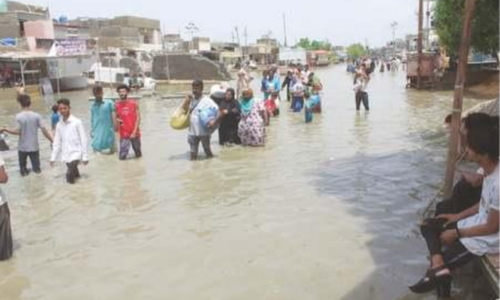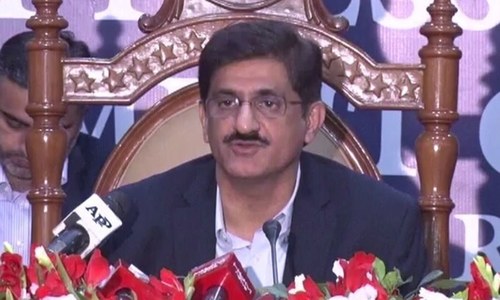KARACHI: The 24th meeting of the Sindh Apex Committee on Monday decided to conduct ‘security audit’ of important installations.
Chaired by Chief Minister Syed Murad Ali Shah, the moot also reviewed the implementation of the decisions it had taken in its previous meetings.
The meeting was held at CM House and Corps Commander Lt Gen Humayun Aziz, provincial Minister Nasir Shah, Law Adviser Murtaza Wahab, Chief Secretary Mumtaz Shah, Rangers director general Maj Gen Omar Bukhari, Inspector General of Police Mushtaq Mahar and other officials attended it.
Madressahs to be registered by edu dept
The meeting was told that around 8,195 madressahs/Imambargahs were located on the main roads and it was decided that no more permissions would be issued for opening a seminary on main road.
The draft Sindh Deeni Madaris Bill had been submitted to the chief minister for approval.
Apex committee is told a new law is under consideration to try street criminals
The interior ministry had notified a working group under the chairmanship of federal education secretary with representatives of ministries and agencies concerned to deliberate on madressah reforms, registration, government funding, mainstreaming, curriculum and foreign funding, etc.
Taking a policy decision, the meeting decided to register religious seminaries as an educational institution by the education department instead of the Auqaf department.
Safe City project
The meeting was told that the Safe City project included facial recognition system, intelligent traffic management system (ITMS), big data analysis system, e-patrolling and model police stations/smart policing and Sindh police automation-decision support system.
The CM said he would release funds for block allocation to install 10,000 cameras at 2,000 sites.
The other components such as installation of trackers in motorcycles, introduction of RFID number plates and establishment of a ballistic lab for firearms registration were under way.
The meeting was told that currently 2,500 CCTV cameras were functional and being monitored through the command and control centre located at the Central Police Office.
The meeting decided to install HD CCTV cameras at all the exit and entry points so that the movement of vehicles and people could be monitored.
The overall financial estimate of the Safe City project has been made at Rs24 billion.
New law against street crime
The meeting was told that a new law to try suspects involved in street crimes was under process for which the government was seeking guidance from the Sindh High Court.
It was pointed out that street criminals could be effectively tried under existing laws and the trial by a sessions court was more effective than trial by a magistrate.
The prosecutor general told the meeting that he had prepared guidelines and circulated them to investigation officers/police asking them to invoke more strict sections of law including robbery, commonly known as street crime, by use of deadly weapons or inducement causing grievous hurt.
Karachi police chief Ghulam Nabi Memon told the meeting that mobile phone and motorbike snatching had increased in the city.
At this, the committee urged police to launch an operation against the shopkeepers purchasing spare parts of snatched vehicles and mobile phones.
The meeting was also told that every Saturday training sessions were held for IOs and FIA officials on terror financing and money laundering.
The meeting decided to request the high court to designate sessions courts exclusively for trying street crime cases It was told that terrorism was on its peak in 2013 when 51 incidents had taken place; whereas just six incidents took place in 2020.
It was also pointed out that the acquittal of accused in Daniel Pearl murder case and acquittal of one of the accused in PIDC bomb blast case had been challenged in Supreme Court.
The meeting was told that a list of 268 undertrial blacklist criminals/terrorists had been shared with prosecutor general for effective prosecution.
Security for CPEC projects
The meeting was told that as per the apex committee’s earlier decision security of all the China-Pakistan Economic Corridor (CPEC) projects’ employees, particularly Chinese nationals, had been strengthened.
There are 12 CPEC projects in progress in the province in which 1,028 Chinese personnel were working. They had been provided 4,372 law enforcement personnel, including police, Rangers, FC and army for security.
The meeting was told that 136 non-CPEC projects were going on where 1,052 Chinese nationals were working. They had also been provided 268 police, Rangers, FC and army personnel for security.
It was pointed out that Mai Bakhtawar Airport, Islamkot was to be made operational by the Civil Aviation Authority in view of the vulnerability of road travel, commercial viability and travel cost.
The meeting urged the CAA to make the airport operational.
Security of shrines
The IGP told the meeting that the security audit of all dargahs/shrines had been done and shared with the deputy commissioners concerned.
Necessary police force had been deployed according to the sensitivity, he added.
There are 560 shrines in the province and their security has also been categorised as per their sensitivity and requirement.
After reopening of the shrines, 819 policemen and security guards have been deployed there, the meeting was told.
The IGP told the meeting that there were four areas in Sindh bordering Balochistan and Punjab. The areas included Kashmore, Jacobabad, Shahdadkot and Ghotki, where 16 police stations and 60 checkpoints had been established with a force of 1,072 policemen.
The IGP said that patrolling in the katcha area had also been intensified.
The city police chief also told the meeting that in 2013 some 2,789 cases of killing were reported and the number went down to 491 in 2019.
The incidents of targeted killing recorded at 509 in 2013 came down to 12 in 2019.
The cases pertaining to kidnapping for ransom came down from 78 in 2013 to 41 in 2019. Similarly, 533 cases of extortion were reported in 2013 which also came down to 128 in 2019.
Published in Dawn, August 25th, 2020














































